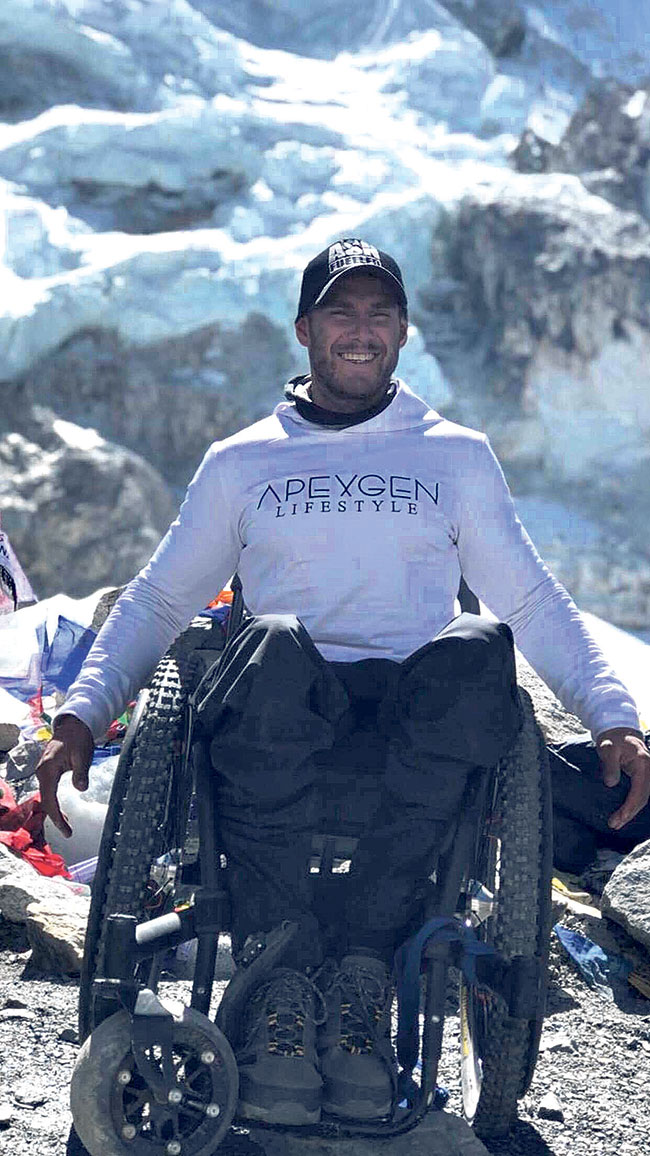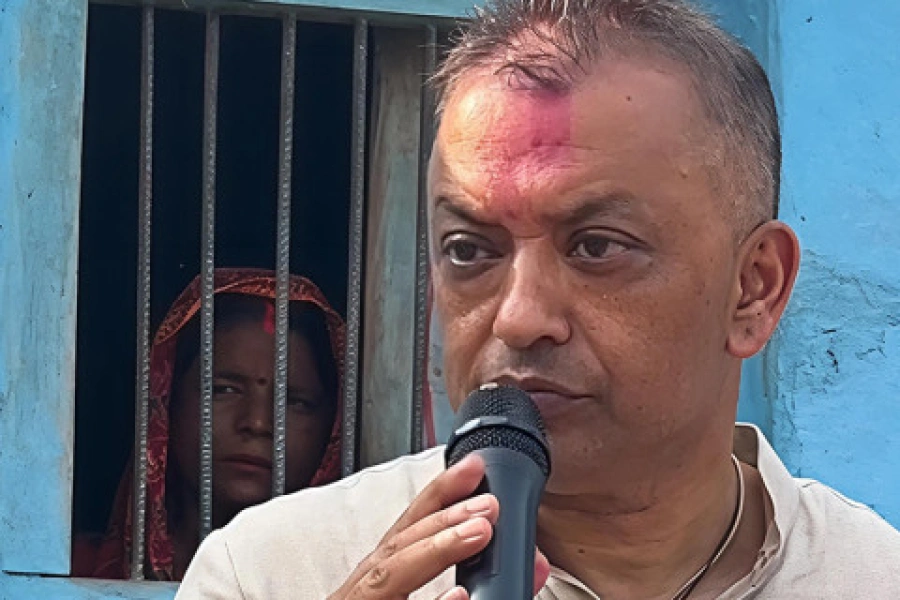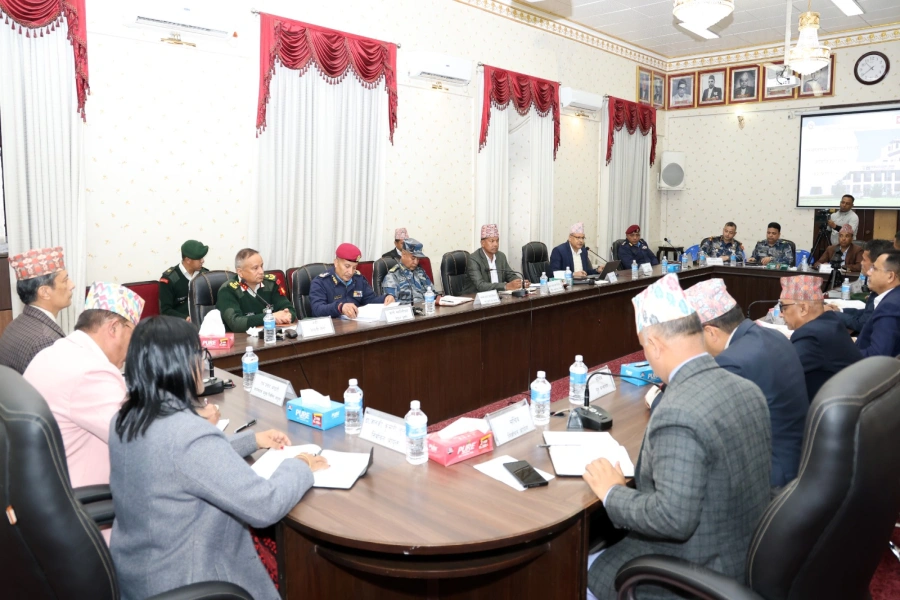For Scott Doolan, a paraplegic athlete from Australia, it’s the mind, not the body, that limits you.
“It’s all in your mind. If you want to achieve something, you know you can achieve it,” the 29-year-old fitness enthusiast told Republica when he returned from the mountains to Kathmandu earlier this month.
 If he hadn’t lived that thought, he couldn’t have trekked – mostly on his hands – to the Base Camp of Mount Everest, becoming the first paraplegic to achieve that feat. For somebody on wheelchair, coming from the sea level of New Castle in New South Wales and having never been at an altitude of 5000 meters or touched a rocky mountain, it wouldn’t be possible otherwise.
If he hadn’t lived that thought, he couldn’t have trekked – mostly on his hands – to the Base Camp of Mount Everest, becoming the first paraplegic to achieve that feat. For somebody on wheelchair, coming from the sea level of New Castle in New South Wales and having never been at an altitude of 5000 meters or touched a rocky mountain, it wouldn’t be possible otherwise.
Scott completed the 65-kilometer ‘trek’ from Lukla to the Base Campin 10 days, which generally takes 12 days for an average person walking on two legs.
The determination and zeal of Scott could be an inspiration for many, according to Dawa Gyalpo Sherpa, owner of Darjeeling-based Blue Dragon Adventure and leader of the expedition.
It was an uncommon trek, not less than a real expedition for somebody on wheelchair. There were parts where Scott could do on wheelchair and parts when he had to jump off and ask one of the boys in the expedition team to help. His trainer and friend Matt Laycock had to hold his legs so that he could crawl on his hands. Some parts were too dangerous, and some were too rocky. Then he had to jump on one of the Sherpas’ backs.
On day 8, the front left wheel of Scott’s wheelchair broke. After that, things became bit complicated. The modes of his journey were then reduced to two – crawl on his hands when he could, and be carried on somebody’s back where he couldn’t. Dawa and his team took the onus of carrying him on their backs.
Along the way, he had some difficulty adjusting to Dal Bhat (lentil soup and rice). By the time he reached the Base Camp, he had stress fracture in the tale bone and a chest infection. But he overcame it all, showing tremendous will.
The ultimate trek

“Scott is extremely focused and determined,” said Dawa. “He is a person with a positive outlook for everything he does. It is that outlook which made the trek successful.”
Twelve years ago, when Scott was 17, he lost his ability to walk and run due to a motorbike accident. Before that, he used to play cricket and was “pretty competitive” in rugby league. He also played golf, tennis, and basketball.
The accident changed the mode of his physical activity, not his willpower.
“That accident put me in the direction of fitness,” said Scott, whose bulging biceps and delts and pecks would inspire anybody who is into bodybuilding. He still plays basketball on the weekends, and does wheelchair sprinting.
He is planning to go for swimming at the 2020 Paralympic Games in Tokyo. He is also planning to climb thehighest mountain in Africa, the 5895-meter Mount Kilimanjaro of Tanzania.
How it came about
It all started about a year ago in Australia when Apexgen, a sportswear company, suggested him to go to the Everest Base Camp.
“It almost came out of the blue. My first reaction was—it can’t be done. But then I thought, why can’t it be done? And I started training.”
The team leader Dawa was bit concerned about training. “I wanted to make sure he trained properly, as I know how difficult it could be. I was preparing to even go to Australia to help him train. But somehow it couldn’t happen.”
“Before we could set on the trek, we had to plan everything in minute details. We cautiously interviewed all the boys before taking them in our team. There were so many other logistic things to look after,” Dawa said. “But that aside, it was due to Scott’s sheer willpower that the impossible became possible. Everything turned out well.”
Takeaways
For Scott, Nepal has many wonders. But the most amazing thing here are the village children who “don’t need anything to be happy”.
“The Himalayan mountains are spectacular. I came across so many beautiful villages,”he said. “But the children, they are wonderful. Nepali children are just playing around in the dirt. And they seem so happy just doing that.”
“They don’t have much resources here and it’s twice as cold in the villages than in Australia. That stood out lot to me,” He added. “I have taken things for granted when I was in Australia, but these kids here have so little with them. Still they are so happy.”
“Once I reached the Base Camp, it was pretty humbling. When I first touched the rock, I was filled with excitement. There were a lot of people standing around, lot of cheering. I was overtaken by the love and appreciation.”
The experience of reaching the Base Camp was incredible enough. But we wanted to know what else he found interesting about Nepal, and asked him what he was taking back home from the journey.
“The cultural experience has been amazing. But most importantly, here I put my full trust in the people. I never sort of did that before I came here,” Scott said. “You need people, you need to have trust on them. I will definitely take that back.”





























-1200x560-1771928761.webp)









